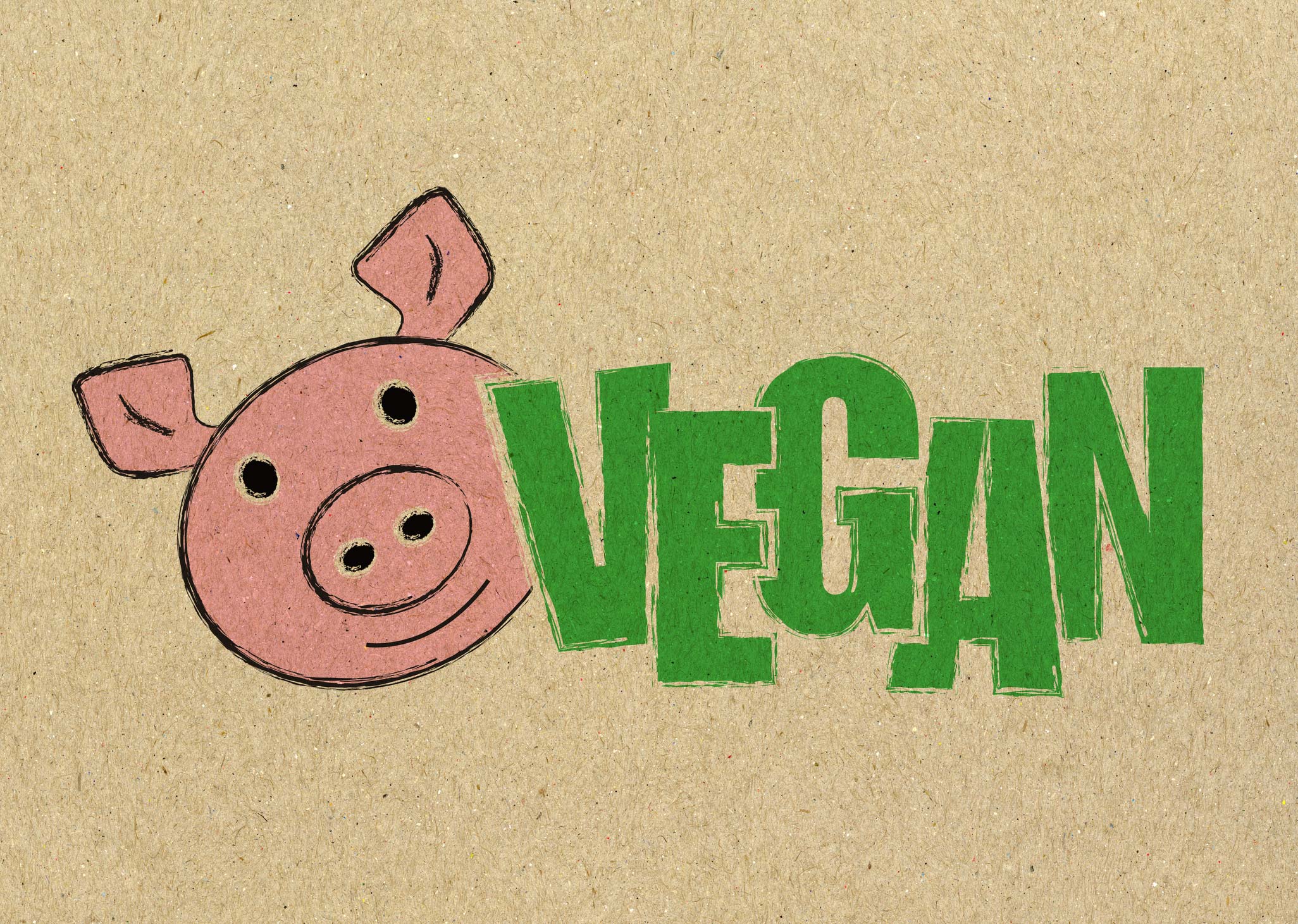If you Google “broccoli summer camp,” “kale summer camp,” and “cauliflower summer camp,” you’ll come up empty. You’ll find summer recipes for these cruciferous stars, sure, but no weeklong vacation event dedicated to them.
When you search for “bacon summer camp,” by contrast, you’ll discover that there is such a thing. With speakers, cooking tutorials, panel discussions, butchering demos, and even a bacon film festival, Camp Bacon caters to one of the hottest foods of the past decade.
And that’s just the tip of the strip, if you will. Someone spent enough time and energy to figure out that 62% of US restaurants have bacon on the menu. The average American consumes almost 18 pounds of bacon per year – and if you don’t, then someone out there is eating 36 pounds to keep the average up. There’s a National Bacon Day in the US. And bacon has gone from breakfast meat to ubiquitous star ingredient in everything from bacon-wrapped hot dogs and steaks to desserts like cupcakes and ice cream. And if I haven’t yet convinced you that bacon makes people highly irrational, there’s a Seattle company that sells bacon-scented underwear for men and women.
These days, whenever an animal-based product becomes hugely popular, plant-based versions aren’t far behind. Thanks to a growing market, new technologies, and social media experimentation, there are now plant-based bacon alternatives that are getting closer and closer to the original. According to the online food ordering company Grubhub, users ordered vegan bacon 113% more in 2019 than the year before.
And it’s a good thing, too! Bacon comes from pigs, the vast majority of which (approximately 95%) are raised on factory farms, which carry a whole host of ethical and environmental problems. And that’s not even mentioning the health effects of bacon, which is a highly processed meat.
So in this article, we’ll take a look at vegan bacon: why it can be a much better alternative to the stuff that comes from pigs, how you can make it yourself, and recipes that use plant-based bacon.
Benefits of Vegan Bacon
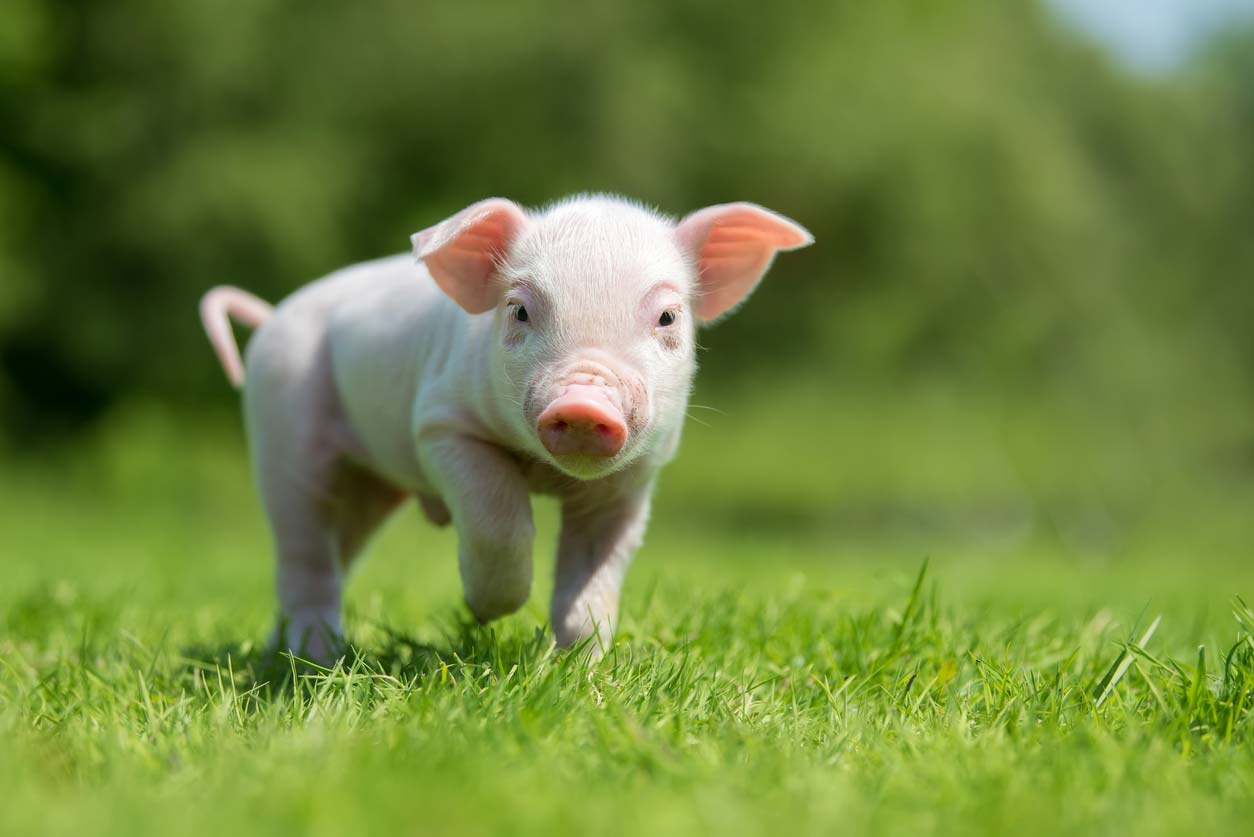
When you substitute vegan bacon for traditional bacon, almost everything gets better.
Saying No to Animal Cruelty
First of all, vegan bacon doesn’t arrive on your plate with a heaping side of animal cruelty. In an average week, more than 2 million pigs are slaughtered in the US alone, for a rough total of 129 million deaths per year. (Globally, the number is close to 1.5 billion.) And almost all these animals are processed into “pork” products — primarily bacon, ham, and sausage.
That’s a lot of killing. But numbers don’t tell the whole story. The pig’s lives are arguably more miserable than their deaths. Female pigs are first impregnated at 7 months of age and live out their lives in a cycle of pregnancy, birth, and nursing until they are eventually sent to slaughter. To ensure fertility, they are drugged with hormones. Whether being bred or just raised for slaughter, pigs are kept in confinement, barely able to turn around or lie down (yes, the pregnant ones as well). They spend their short lives wallowing in and breathing their own waste.
And these are highly sentient and social beings we’re talking about. Pigs who are allowed to live out their lives in farm sanctuaries are playful, affectionate, and highly intelligent. In fact, despite the stereotypes, pigs are very clean and hygienic creatures by nature.
While organic and pasture-raised pigs unquestionably have better lives than their factory-farmed peers, many still live (and die) in ways that Wilbur and Babe would not appreciate.
When you replace bacon with vegan bacon, you eliminate all this cruelty completely.
Saying No to Antibiotic Resistance
It’s not just the pigs who suffer because of factory farming. Pig farmers use, on average, nearly four times as many antibiotics as cattle ranchers, per pound of meat. This is a huge public health problem for humans, as misuse of antibiotics contributes to the rise of antibiotic-resistant “superbugs” that cannot be treated by medicines. Given that we’ve seen how much damage a viral pandemic can do, it just seems like common sense not to encourage the development of potentially disease-causing bacteria. Vegan bacon turns off that spigot.
Saying No to Toxic Waste
Each year, pig farms produce about 270 million tons of waste in the US alone (billions of tons worldwide) — all of which have to go somewhere. The disposal of this waste has toxic effects on workers, local residents, the groundwater supply, air quality, and the surrounding environment. Think asthma. Think lagoons brimming with feces and rotting hog carcasses. Think air that stinks so bad that people get sick from just breathing outside air.
And these effects are disproportionately visited on marginalized, poor communities. If you have money, you have the means to prevent hog farms from setting up shop within sniffing distance from your home.
Eating vegan bacon is therefore an act of environmental stewardship and social justice.
Saying No to Carcinogens
You don’t have to live near a pig farm to be harmed by bacon. All you have to do is eat it. A study in The International Journal of Epidemiology found even a modest intake of processed meats such as bacon was “associated with an increased risk of colorectal cancer.”
A British Medical Journal study found that consumption of red meat, both processed and unprocessed, was associated with increased risk of death from every one of the specific causes of death they looked at — including cancer, heart disease, stroke, and other cerebrovascular diseases, respiratory disease, diabetes, infections, kidney disease, and chronic liver disease.
In addition, the World Health Organization (WHO) declared red and processed meat to be carcinogenic. They contain nitrates and nitrites which can form nitrosamines, which are carcinogenic in animals, and likely humans as well.
Saying Yes to Plant-based Nutrition
So far vegan bacon wins just by not coming from pigs. But depending on the ingredients, plant-based bacon could actually be good for you. Healthy plant foods can be rich sources of fiber and of essential vitamins and minerals, including protein, calcium, antioxidants, and other phytonutrients. These can help prevent many chronic diseases.
How to Make Vegan Bacon
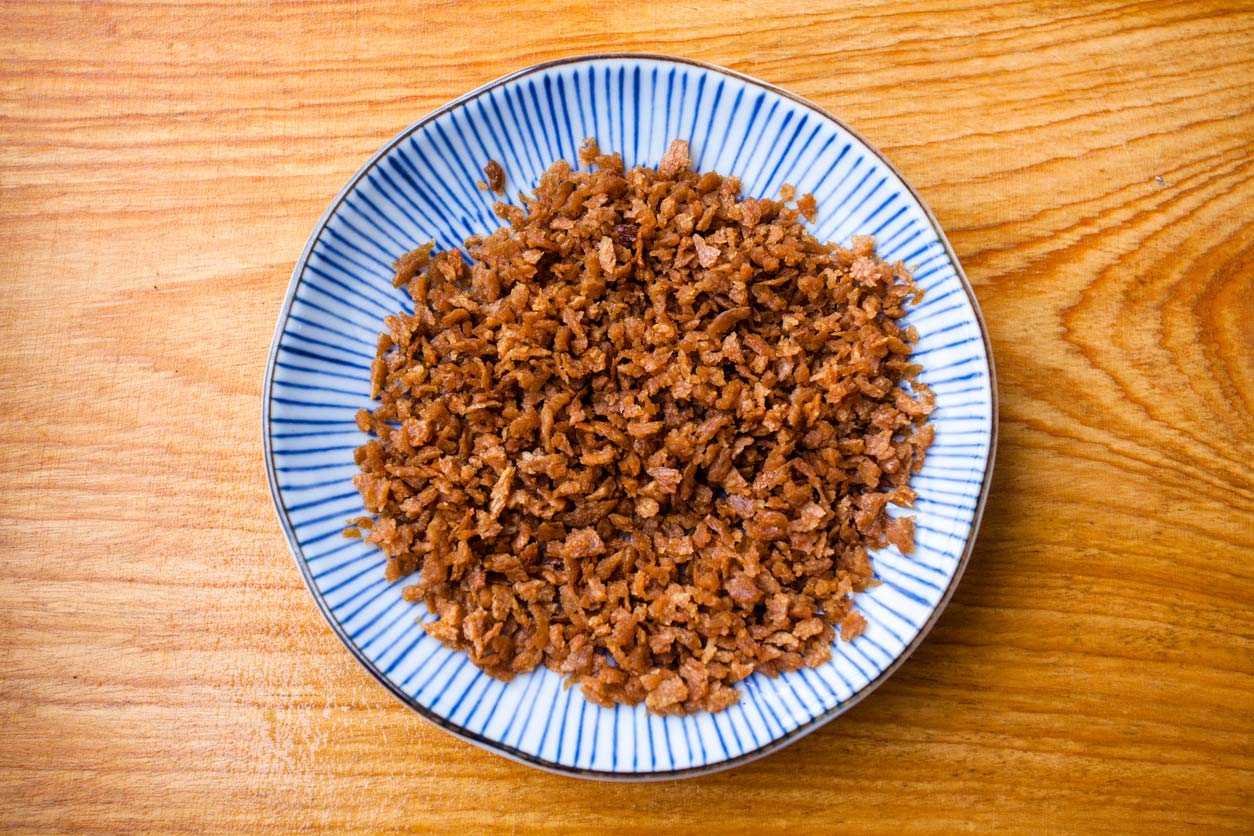
There are more and more vegan bacon products for sale in stores, and some of them taste remarkably good. But many of them are highly processed foods. Plus, they tend to be high in saturated fat (from coconut or palm oil), very high in sodium, and they can get more than a little expensive. With a little know-how (see below!) you can make your own vegan bacon – saving money and doing a good turn for your health at the same time.
Since vegan bacon is such a winner for animals, the environment, and human health and wellbeing, it’s really important that it tastes good. That way, more people will be willing to switch, and not be seduced by the “but… bacon!” lure as they consider shifting away from an animal-centric diet.
The Essence of Vegan Bacon Taste
So now let’s think like foodies. Vegan bacon should retain the salty, sweet, fatty, and smoky notes, and soft chewy texture, typically associated with bacon. Because it is a smoked meat, it’s important to highlight the smokiness in whatever you’re making. Luckily, that smoke flavor is a function of smoke, not meat, so you can achieve it in a couple of ways.
First, there’s liquid smoke — just a couple of drops can pack a punch, so you don’t need to use a lot. Second, smoked paprika is a spice that you can add to the seasoning. Third, you can grill your vegan bacon the same way animal-based bacon is grilled, with wood smoke permeating the “meat.”
When you’re making vegan bacon, if you want to compete with the traditional bacon on the flavor front – this probably isn’t the time to go low-fat. Because traditional bacon comes from some of the fattiest parts of a pig, plant-based foods that contain some fat will produce the best bacon-like flavors. Higher-fat plant foods can also ensure a texture that’s relatively crispy without getting burnt, and that also allows for a little bit of chewiness and flexibility. And having some fat allows for the vegan bacon to be baked or air-fried, as well as (if it’s your thing) fried in a pan with oil.
Putting Together the Basics of Vegan Bacon
You’ll find some of our favorite vegan bacon recipes later in this article. But before we get out the shopping lists and the measuring spoons, let’s talk about the principles and steps that will set you up for success.
- Determine what texture you desire. For crispy, select thinly sliced carrot, coconut flakes, eggplant, banana peel (yes, seriously – more on that below) or strips of rice paper. For chewy, select thinly sliced tofu, tempeh, or seitan. If you have a mandoline on hand, you can use it to thinly slice carrots and eggplant, which helps create a crispy texture.
- Make your marinade: To make a bacon-flavored marinade you’ll definitely want to include either smoked paprika or liquid smoke for that smoky flavor (unless you plan to grill it using wood smoke). We love a blend of reduced-sodium organic tamari with a touch of maple syrup and liquid smoke plus some seasoning like onion powder, garlic powder, and smoked paprika. See the recipes below for several marinade options.
- Soak your plant “bacon” of choice in its marinade for at least 20 minutes. If you plan ahead, marinating any of the plant-based options above overnight helps to concentrate the flavors.
- Bake, grill, or air-fry. The cooking time can vary depending on the selected item and mode of cooking. For example, carrot bacon takes only five minutes to cook in the Air Fryer, but 20 minutes in the oven, while mushrooms can take up to 30 minutes in the oven.
Foods You Can Make Vegan Bacon With

This is a rapidly growing list, thanks to energetic experimenters, vegan bloggers, and cookbook authors.
Coconut
When we think of high-fat vegan ingredients, coconuts come to mind, and they make an excellent bacon substrate. While there’s a huge debate about whether coconut is good or bad for you, that debate centers largely around coconut oil, which is not a whole food. Fresh or dried coconut flesh is a whole different thing — and many healthy cultures include these foods as dietary staples.
And remember, we’re talking about vegan bacon here. No matter how you make it, this should not become one of your new food groups. With the salt, sweetness, and fat required to make your bacon taste good, these will always be “treat” foods rather than central parts of your diet.
Tempeh
These blocks are made of fermented whole soybeans and are one of the healthiest ways to enjoy this very healthy legume. You can turn tempeh into bacon by slicing it thin and marinating it in a sweet and salty marinade. See our recipe below for easy and delicious tempeh bacon.
Carrots
They don’t have much fat, but they do have a lovely sweetness and a surprisingly accommodating texture. You can get long strips of the right dimensions with a vegetable peeler and a little practice. And carrots are right up there with the world’s healthiest veggies! In our recipe below, the fat comes from the tahini in the marinade.
Rice paper
Popular in Vietnamese cooking, these round discs are dampened to make them flexible, and often form the exterior of veggie rolls. The trick to making them into bacon is to cut them into strips while still dry and brittle, then wetting the strips so they stick together. Add marinade, air-fry, and voila.
Rice paper may not be the best option from a health perspective, as they are a processed food made from rice flour. Also, rice from many parts of the world tends to be high in arsenic, so you likely don’t want to overdo this bacon ingredient.
Seitan
This plant-based meat alternative is made from wheat gluten, the protein that, like its name suggests, glues wheat flour together when mixed with liquid. Once mixed and cooked, seitan has a texture very much like cooked chicken or pork and can be sliced thinly to approximate bacon. It also can absorb flavors very well, so a good marinade goes a long way here.
If you’re allergic or sensitive to gluten, it makes sense to avoid seitan. But for many of us, the gluten found in whole grains may actually provide a net nutritional benefit. So despite what you may have heard, most people have little reason to fear foods containing gluten.
Tofu
Like its cousin tempeh, tofu comes from soybeans. In this case, they’re processed, and no longer a whole food. Still, compared with the meat that it replaces, tofu is very healthy. The best tofu for bacon will have a low water content, which generally means you want firm or extra firm tofu. You can squeeze water out by wrapping the tofu block in a towel and placing a weight on top of it.
Pro tip: To create a remarkably spongy base that’s ready to absorb delicious flavors: drain, freeze, then thaw firm tofu in the refrigerator before squeezing out excess water and preparing it for your dish.
Mushrooms
Technically not plants, mushrooms can nevertheless be incredibly good for you. And mushrooms have an advantage in the bacon department because of their natural chewiness and umami flavor profile. Check out the mushroom bacon “topper” recipe below.
Banana Peel
Yes, you read that right. It turns out that banana peels themselves are highly nutritious. They’re rich in nutrients like potassium, fiber, essential amino acids, polyunsaturated fats, and antioxidants. And they can make a mean vegan bacon, with the added benefit of having a bunch of bananas to eat as well. Just make sure to get organic bananas if you’re planning on eating the peels because otherwise, you could be facing a nasty dose of pesticides.
Eggplant
Another chewy veggie, eggplant can slice thin and accepts the flavor of whatever marinade it meets. You can bake or air fry eggplant into flexible and crunchy bacon-like strips.
How to Use Vegan Bacon
Now that you’re familiar with the ways to make vegan bacon, let’s talk about how to enjoy it. Here are a few suggestions. They aren’t meant to be exhaustive but are intended to stir your own creativity. After all, if people out there are putting pork bacon into cupcakes, you should be able to think of some “out-there” uses of your own for vegan bacon!
- Bacon bits – as a topping on salads or over chili or baked potatoes (or sweet potatoes)
- With breakfast (in a chickpea omelet)
- In sandwiches and wraps
- Mixed into a veggie side dish (for example, roasted Brussels sprouts or green beans)
- As a plant-based pizza topping
- In a pasta dish
- In stuffed vegetables like peppers or cabbage
- In savory pies or hand pies
And Now… The Recipes
If missing the smoky flavor and crunchy texture of traditional bacon is what’s holding you back from going plant-based, then stop what you’re doing and start creating. Smoky Crisp Carrot Bacon provides tons of crunch and is delicious by itself as a snack, alongside a tofu scramble or in a sandwich as a “BLT.”
While Tempeh Bacon isn’t as crunchy, it’s definitely just as tasty, plus it provides plenty of plant-based protein, prebiotic fiber, and lots of phytonutrients that traditional bacon doesn’t provide.
The Mushroom Bacon “Topper” is just one example of the versatility that edible fungi offer. Add it to salads, on avocado toast, or on top of pasta.
Finally, Shiitake Bacon mixed with kale, edamame and pepitas might be one of our favorite combinations of all time. Enjoy it knowing that you’re giving so much goodness to both your body and the planet.
1. Tempeh Bacon
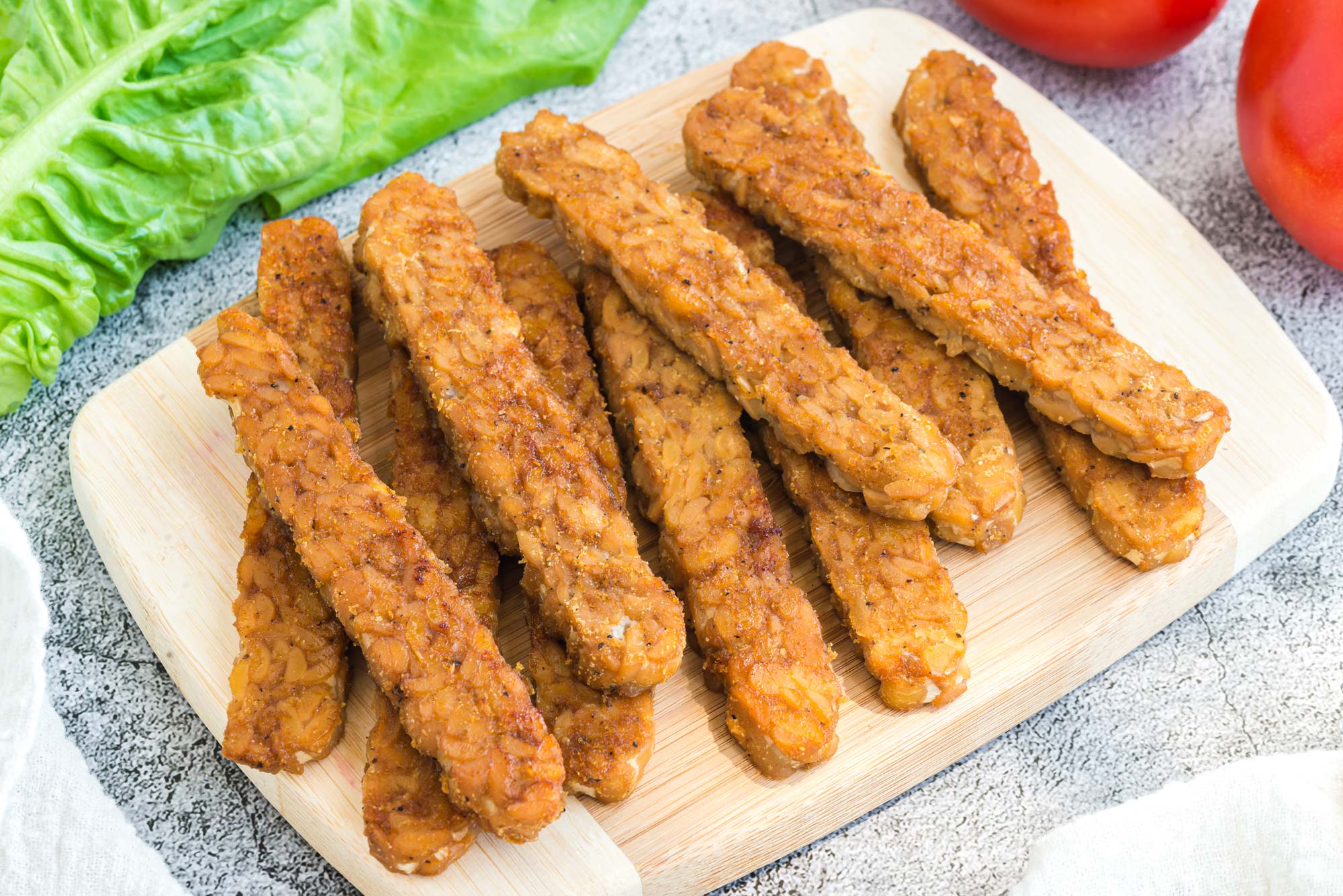
This environmentally friendly, protein-rich, and fiber-filled vegan “bacon” is savory, smoky, and satisfying. The trick for getting tempeh to absorb all of the delicious marinade flavors is to steam or boil it first, for about 15 minutes, which softens the tempeh, allowing the marinade to fully absorb. Make a tempeh “BLT” (or “TBLT”) sandwich, add to grain bowls, crumble into salads, enjoy alongside a tofu breakfast scramble, or eat it all by itself as a snack!
2. Smoky Crisp Carrot Bacon
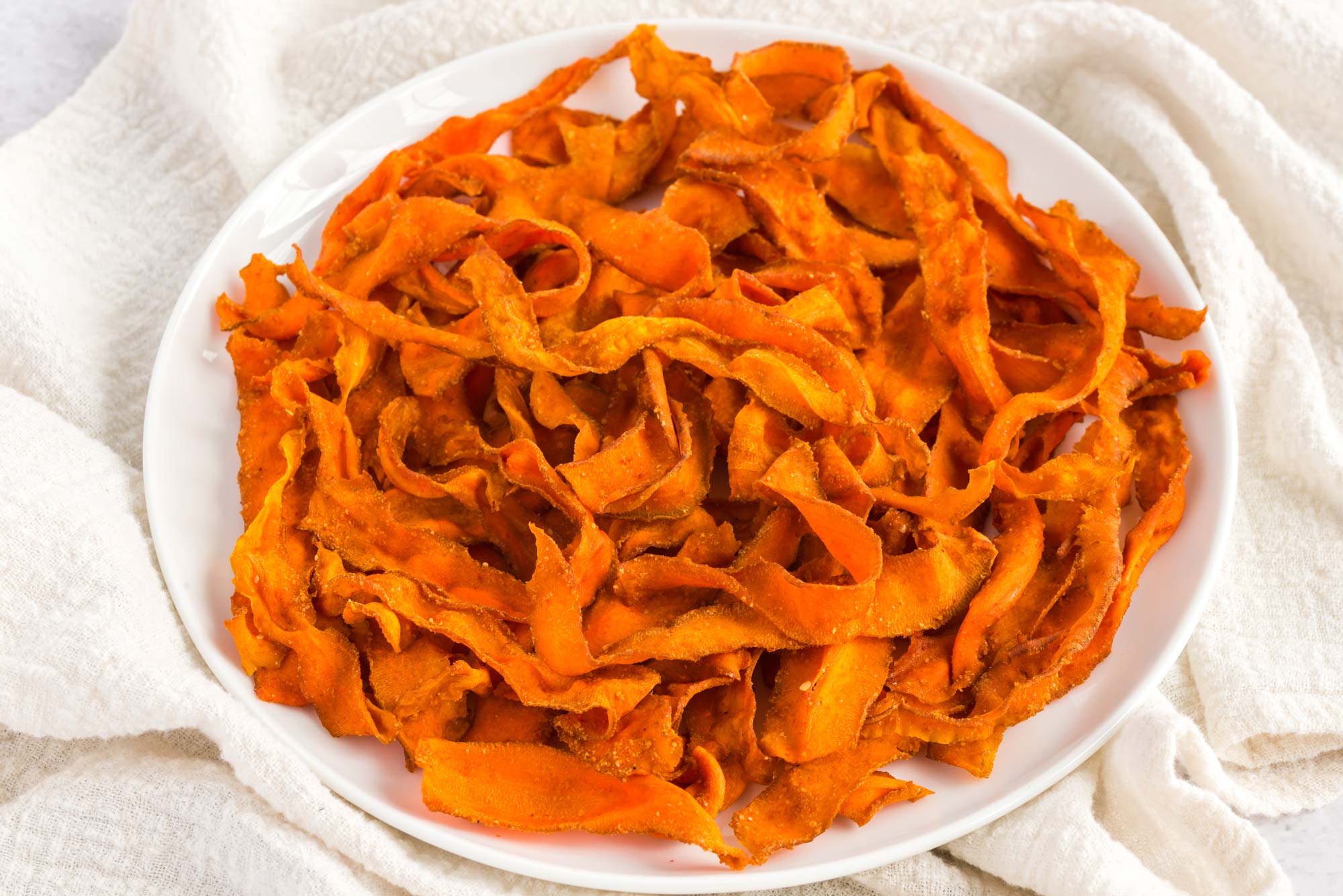
Crispy, smoky, and nutritious! That describes carrot bacon — it has the crunch and flavor yet none of the environmental impacts of traditional bacon (bonus points if the carrots are coming directly from your very own garden!). This dish is a fun, simple, and delicious way to use carrots in your kitchen.
3. Mushroom Bacon “Topper”
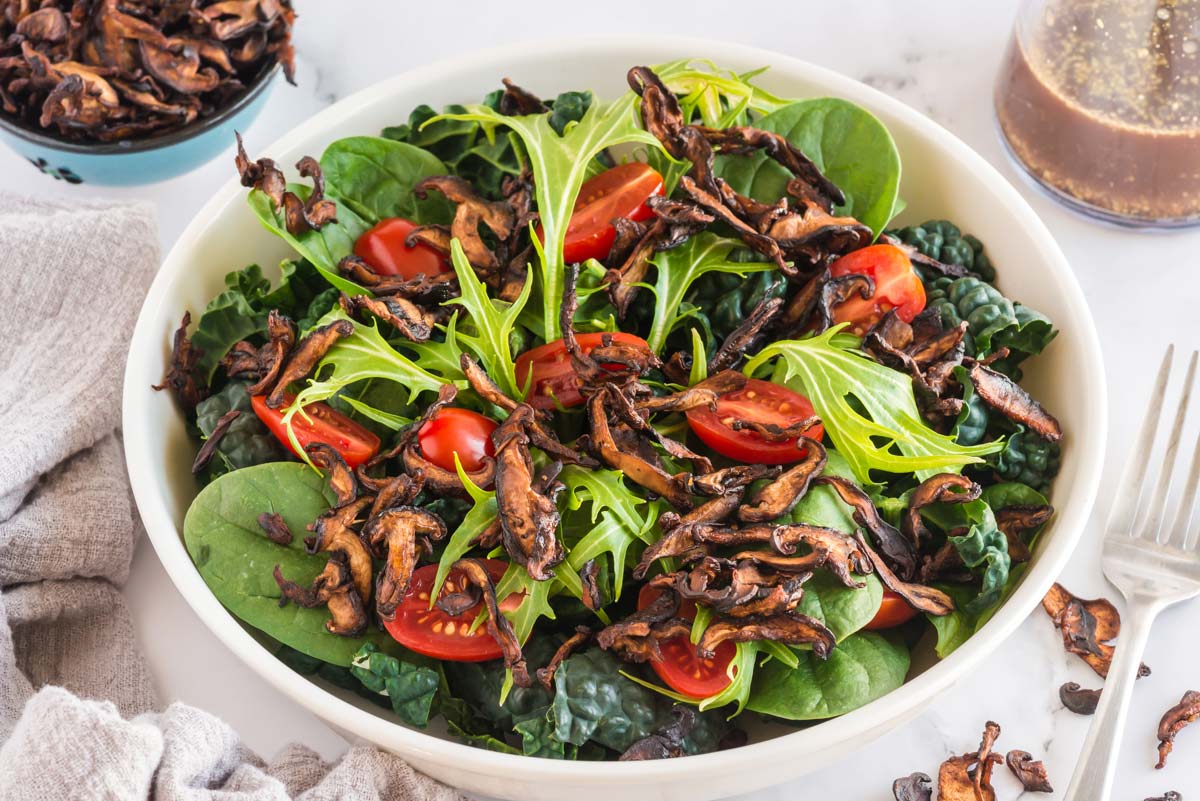
Thinly sliced shiitake mushrooms baked in a smoky marinade transform into a tasty “bacon” that is fabulous on pasta, salads, and more. Plus, unlike traditional bacon, shiitake mushrooms are low in calories and packed with nutrition — providing vitamins, minerals, and other health-promoting compounds.
4. Warm Kale Edamame Salad with Shiitake Bacon and Toasted Pepitas
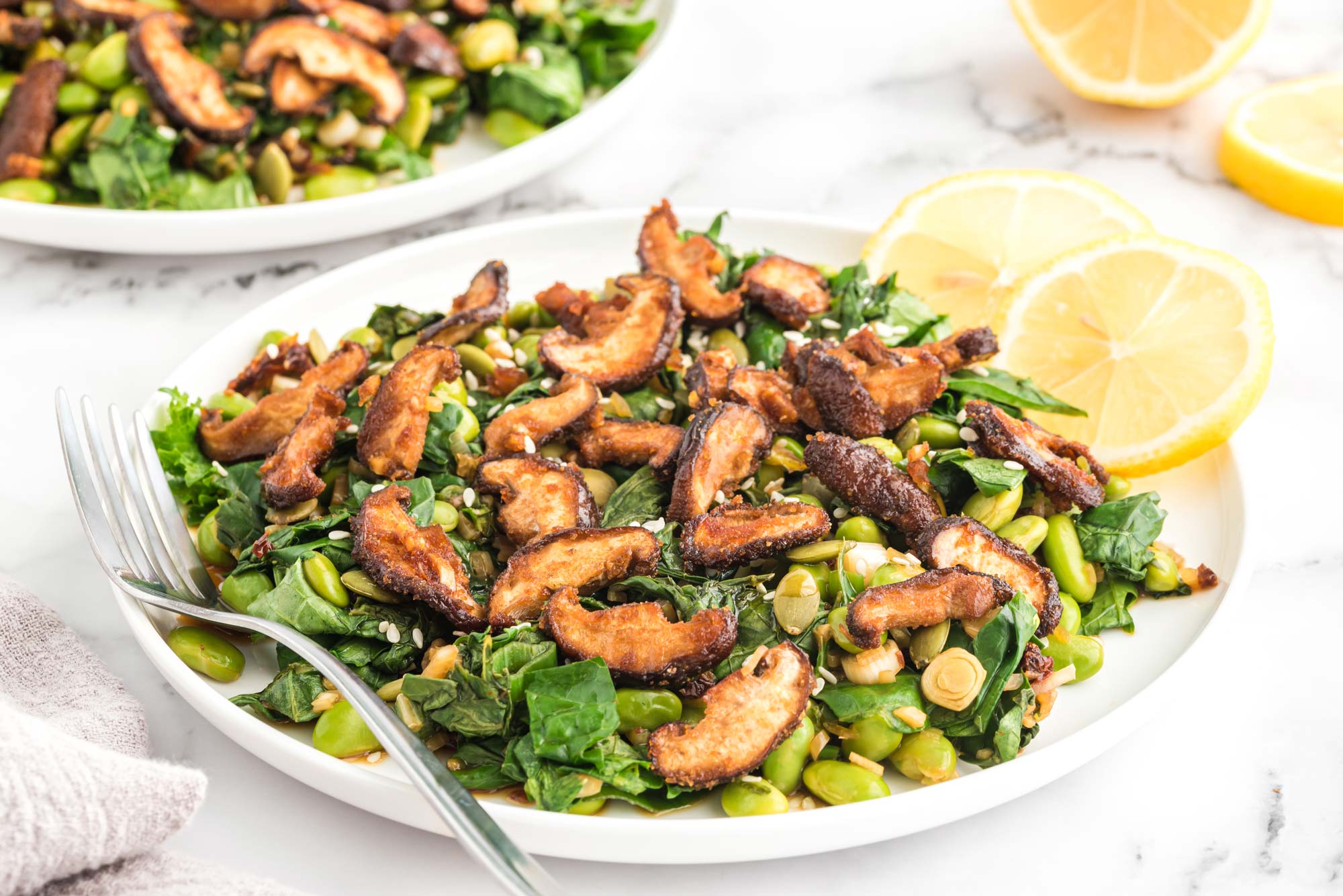
Adding vegan bacon to your salad can elevate it from simple and satisfying to wow! Shiitake bacon is bursting with flavor and complements the kale and edamame perfectly for a light, but oh-so-satisfying meal. Not to mention they all bring plant-powered nutrients that are healing and nourishing to us as well as the planet.
5. Carrot Bacon “BLT”
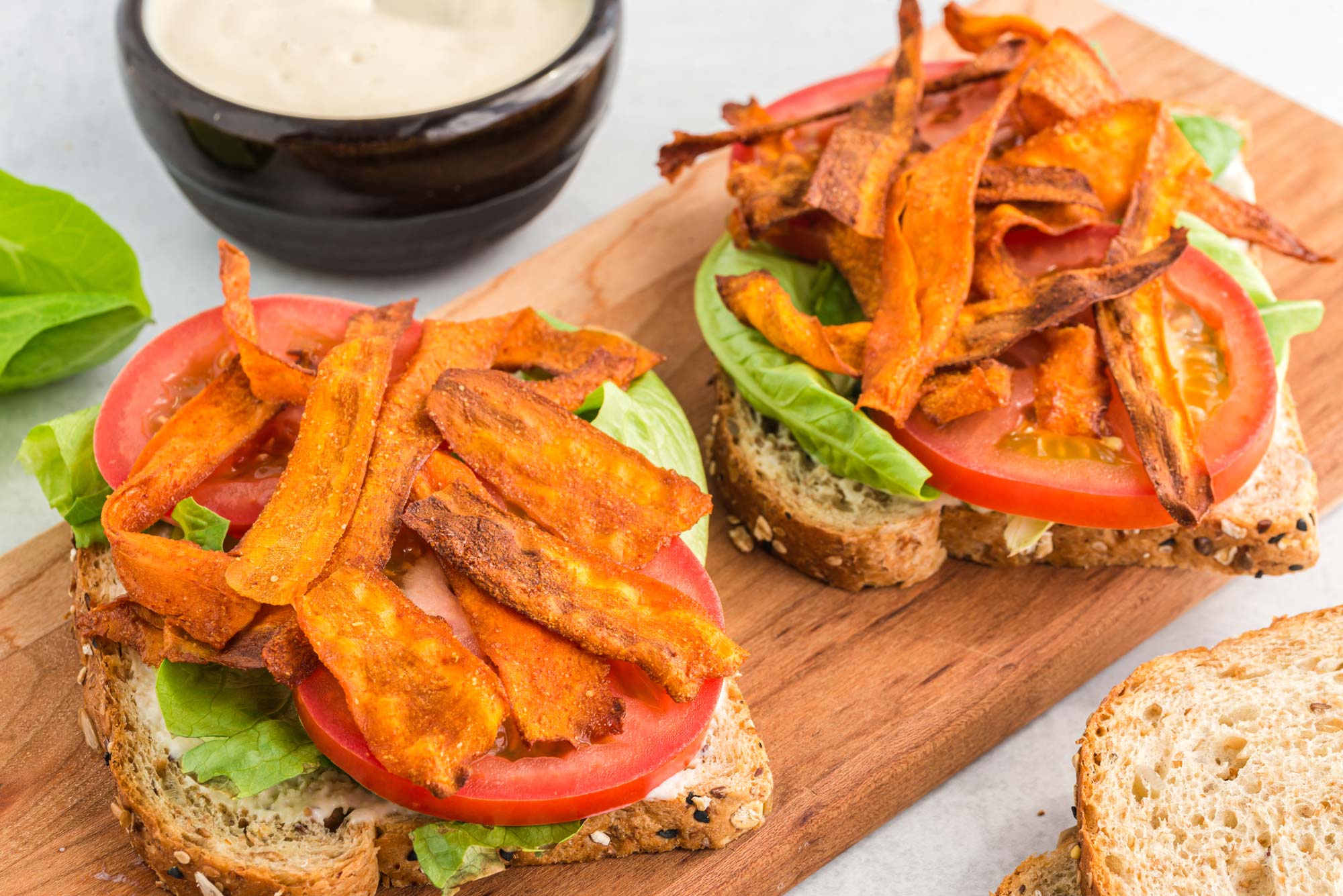
This tasty take on a “BLT” has all the flavor, crunch, AND nutrition without the environmental impact of traditional bacon. What’s more, it’s so simple! Pile it high with lettuce and tomato or add your own spin by adding other veggies like radish, sprouts, or sliced roasted beets. Make it your own and know that you’re doing your body, and the planet, a lot of good.
Bring Home the (Plant-Based) Bacon

Bacon is hugely popular, but it comes with a heaping side of animal cruelty, harmful environmental effects, and health concerns. Luckily, you can still enjoy similar versatility and deliciousness with vegan and plant-based versions. There are many plant-based foods that you can turn into bacon alternatives. So have fun and enjoy the recipes!
Tell us in the comments
- Have you tried vegan bacon? What did you think?
- What’s one recipe for vegan bacon that you’d like to try?
- What dishes can you add vegan bacon to?
Feature image: iStock.com/ChrisSteer
